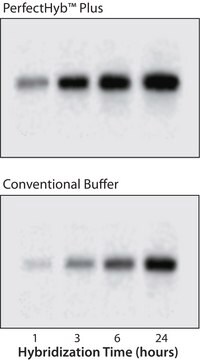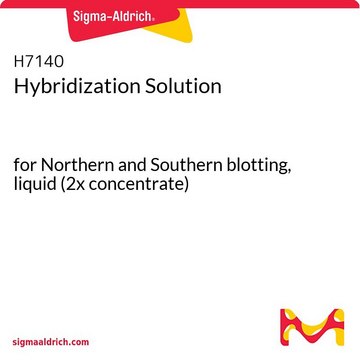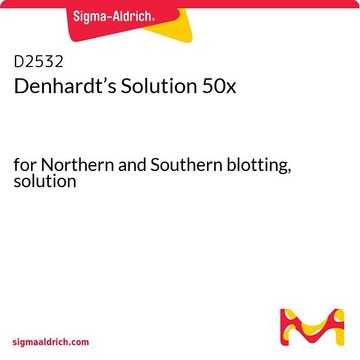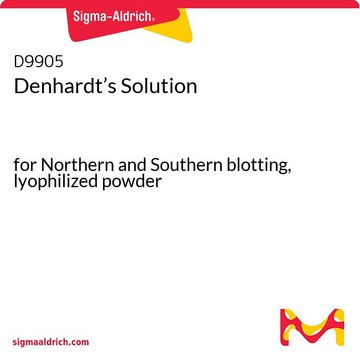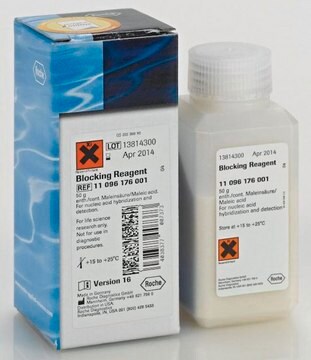11717472001
Roche
Hybridization Buffer
pH 6.5-6.7 (25 °C), suitable for hybridization, solution, pkg of 100 mL
Synonym(s):
Buffer
Sign Into View Organizational & Contract Pricing
All Photos(1)
About This Item
UNSPSC Code:
41105326
Recommended Products
form
solution
Quality Level
packaging
pkg of 100 mL
manufacturer/tradename
Roche
technique(s)
hybridization: suitable
pH
6.5-6.7 (25 °C)
storage temp.
2-8°C
General description
Hybridization Buffer is a denaturing solution that optimizes the binding of DNA and RNA probes to specific target sequences in various techniques.
Hybridization buffer is used in combination with the PCR ELISA (enzyme-linked immunosorbent assay) and the series of DIG-Detection ELISAs for nucleic-acid hybridization reactions.
Application
Hybridization Buffer has been used for the prehybridization of coverslips in protein competition assay of human foreskin fibroblasts (HFF) cells. It has also been used to perform hybridization in northern blotting.
Physical form
Solution
Other Notes
For life science research only. Not for use in diagnostic procedures.
Signal Word
Warning
Hazard Statements
Precautionary Statements
Hazard Classifications
Skin Sens. 1
Storage Class Code
12 - Non Combustible Liquids
WGK
WGK 1
Flash Point(F)
No data available
Flash Point(C)
No data available
Choose from one of the most recent versions:
Already Own This Product?
Find documentation for the products that you have recently purchased in the Document Library.
Customers Also Viewed
Microsporidia Interact with Host Cell Mitochondria via Voltage-Dependent Anion Channels Using Sporoplasm Surface Protein 1
<BIG>Han B, et al.</BIG>
mBio, 10 (2019)
Microsporidia Interact with Host Cell Mitochondria via Voltage-Dependent Anion Channels Using Sporoplasm Surface Protein 1
Han B, et al.
mBio, 10(4), e01944-e01919 (2019)
Fjola Rut Svavarsdottir et al.
Folia parasitologica, 68 (2021-08-18)
Proliferative kidney disease (PKD) is a widespread temperature-dependent disease in salmonids caused by the myxozoan parasite, Tetracapsuloides bryosalmonae (Canning, Curry, Feist, Longshaw et Okamura, 1999) (Tb). Tb has a two-host life cycle, involving fish as an intermediate host and freshwater
A safer, urea-based in situ hybridization method improves detection of gene expression in diverse animal species
Sinigaglia C, et al.
Developmental Biology, 434(1), 15-23 (2018)
Mingming Liu et al.
Nature plants, 5(4), 389-400 (2019-03-20)
Breeding crops with resistance is an efficient way to control diseases. However, increased resistance often has a fitness penalty. Thus, simultaneously increasing disease resistance and yield potential is a challenge in crop breeding. In this study, we found that downregulation
Articles
Digoxigenin (DIG) labeling methods and kits for DNA and RNA DIG probes, random primed DNA labeling, nick translation labeling, 5’ and 3’ oligonucleotide end-labeling.
Our team of scientists has experience in all areas of research including Life Science, Material Science, Chemical Synthesis, Chromatography, Analytical and many others.
Contact Technical Service